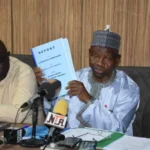We must tackle underlying causes of insecurity to achieve energy stability – Lokpobiri
By Emmanuella Anokam
The Federal Government says addressing the underlying socio-economic causes of insecurity, such as poverty and unemployment, is crucial to achieving lasting stability in the energy sector.
Sen. Heineken Lokpobiri, Minister of State Petroleum Resources (Oil), said this at the Oloibiri Lecture Series and Energy Forum 2024 (OLEF), organised on Thursday in Abuja by the Society of Petroleum Engineers (SPE).
“This can be addressed through implementation of the Host Community Trust Fund, Gas Infrastructure Fund and other intervention mechanism,” he said.
The News Agency of Nigeria (NAN) reports that the SPE-OLEF, hosted by the Petroleum Technology Development Fund (PTDF) has its theme as “Stability in the Energy Sector: Integrated Strategies for Infrastructure, Transportation and Security”.
NAN also reports that OLEF which commenced in 1991 is focused on contributing to Nigeria’s oil and gas industry policy development, in commemoration of the first commercial oil discovery in Nigeria by Shell D’Arcy at Oloibiri, Bayelsa State in 1956.
Lokpobiri, represented by Mr Kamoru Busari, Director Upstream of the ministry, said over the years, insecurity had posed as one of the most pressing challenges to stability in the Nigerian energy sector.
He said there had been cases of pipeline vandalism, oil theft and sabotage that had caused significant threat to the sustenance of the country’s energy infrastructure and smooth operations.
The minister said that concerted efforts were being made to address the security threats in the sector, with the awarding of surveillance contract to Tantita Security Service Nigeria Limited.
This, he said had culminated in substantial increase in oil production.
He said the government would continue to explore better ways resolving some of the bottlenecks in the sector especially through the use of modern technological.
“Government is open to harness all possible advancement pathways by implementing policies and promoting partnerships that will transform the current energy system to a low-carbon energy system, with hydro, solar and natural gas playing important roles.
“Nigeria is working towards achieving its Energy Transition Plan goals, which involves significant emission reductions across key areas like power, cooking, oil and gas, transport and industry with an ultimate target for carbon neutrality by 2060,’’ he said
According to the minister, areas of infrastructure, transportation and security are fundamental to the efficient functioning of the energy sector and its inter-dependent to ensure stability and sustainability.
He said following the strong commitment made by President Bola Tinubu at the recent COP 28, there was an ongoing robust approach by the government to revamp the energy sector.
This, he said was not only being implemented domestically but was being extended to the international communities through friendly competitions of energy supply to the international market.
In the theme lecture presentation, Mr Abdulrahman Mijinyawa, General Manager, Development and Subsurface Nigeria, Shell Companies in Nigeria (SCiN), said Nigeria’s energy infrastructure was largely inadequate, mostly out dated and often damaged.
Mijinyawa, while saying that products were not getting to the desired destination, explained that transportation was a critical aspects of the energy sector for enabling movement of products.
He said for an improved transport system, transport cost should be streamlined, logistic overhead reduced, while public private partnership should be encouraged to fund intermodal connectivity.
According to him, good policies, fiscal incentives, integration and collaboration would go a long way to unlock the industry challenges. (NAN)(www.nannews.ng)
=========
Edited by Emmanuel Afonne
Published By
Has also recently published
 General NewsJune 27, 2024Nigeria requires N348trn to address infrastructure deficit -ICRC D-G
General NewsJune 27, 2024Nigeria requires N348trn to address infrastructure deficit -ICRC D-G BusinessJune 26, 2024Ways and means securitisation responsible for N24trn debt rise – DMO
BusinessJune 26, 2024Ways and means securitisation responsible for N24trn debt rise – DMO SportsJune 26, 2024Paris Olympics: We’re ready to surpass previous achievements – NOC
SportsJune 26, 2024Paris Olympics: We’re ready to surpass previous achievements – NOC Defence/SecurityJune 26, 2024Recruitment: Okiro urges harmony between PSC, Police
Defence/SecurityJune 26, 2024Recruitment: Okiro urges harmony between PSC, Police





